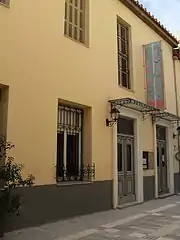Peloponnesian Folklore Foundation
The Peloponnesian Folklore Foundation ‘Vas. Papantoniou’ or PFF (Greek: Πελοποννησιακό Λαογραφικό Ίδρυμα also known as ΠΛΙ) is a nonprofit cultural institution and museum based in Nafplion, Greece. It was founded in 1974 by the folklorist and scenic designer Ioanna Papantoniou in memory of her father Vasilios Papantoniou. The aim of PFF is the research, preservation, study and presentation of the material culture of the Greeks.[1]
Πελοποννησιακό Λαογραφικό Ίδρυμα | |
 | |
| Established | 1974 |
|---|---|
| Location | V. Alexandros Street, Nafplion, Greece |
| Type | Folklore & Fashion museum |
| Founder | Ioanna Papantoniou |
| Website | Peloponnesian Folklore Foundation |
History
PFF was founded in 1974[2] by Ioanna Papantoniou and it is located since 1981 in an early 20th century house belonging to Papantoniou family which was converted into a museum. The same year PFF was awarded with the European Museum of the Year Main Award (EMYA).[3] During the 70's and the 80's, the foundation made several researches over Greece, Cyprus and the Griko communities of Southern Italy, gathering data and documents about the traditional culture, music and dance and also about the preindustrial technology and the old fashioned children toys.[4] In 1989 PFF founded a children's museum in Nafplion at the old local railway station.[5] Four years later, Melina Merkouri (then Culture minister of Greece) assigned to PFF the Hellenic National Costume Archives while in 1999 the foundation's facilities were renovated.[4] In 2013 PFF was awarded by the Academy of Athens for its cultural activities.[6][7]
.jpg.webp)
Artifacts of the foundation have been exposed in various exhibitions worldwide including Athens, Thessaloniki, Brussels, Dallas, Limassol, London etc.[4] in cooperation with foundations and authorities such as Benaki Museum,[4] Municipality of Nafplio, Nicosia Municipality,[4] Harokopio University,[8] Foundation of the Hellenic World, Hellenic Centre of London,[9] Teloglion Foundation of Art[10] etc.
Collections
PFF collections include 45,000 items. The majority of them, more than 27,000 items, are directly connected to the popular and modern Greek culture including traditional costumes and items from mainland Greece, Crete, Aegean and Ionian Islands, Cyprus, Asia Minor, etc. The museum also holds a collection of 5,500 items linked with the history of fashion, including works by designers such as Christian Dior, Issey Miyake, Paco Rabanne, Christian Louboutin, Sue Wong, Mariano Fortuny, Laura Ashley, Jean Dessès, James Galanos, Yiannis Tseklenis etc. Peloponnesian Folklore Foundation also owns a photography, sound and film collection dedicated to its past researches, a library of 10,000 titles a publishing house.
Gallery
 La Falaise by Christian Louboutin.
La Falaise by Christian Louboutin..jpg.webp) Photo by PFF's participation in 1982's Europalia in Brussels.
Photo by PFF's participation in 1982's Europalia in Brussels. A top hat from the 1950s.
A top hat from the 1950s. Paul Poiret dresses.
Paul Poiret dresses. Kaplamas, traditional Greek costume from Megara.
Kaplamas, traditional Greek costume from Megara. Wedding dress from Alexandria, Greek Macedonia.
Wedding dress from Alexandria, Greek Macedonia. Traditional Greek costume from Topolovgrad, Bulgaria by PFF's photo archives.
Traditional Greek costume from Topolovgrad, Bulgaria by PFF's photo archives. Traditional costume from Corinthia, Peloponnese by PFF's photo archives.
Traditional costume from Corinthia, Peloponnese by PFF's photo archives. Chemise from Attica region, early 20th century.
Chemise from Attica region, early 20th century. 19th century gloves.
19th century gloves.
References
- "History". pli.gr. Peloponnesian Folklore Foundation. Retrieved 25 April 2017.
- Kanellopoulos, Kanellos (2002). Το αποκεντρωμένο μουσείο και η συμβολή του στη βελτίωση της ποιότητας ζωής και στη σύγχρονη πολιτισμική ανάπτυξη: Το παράδειγμα του ΠΛΙ (in Greek). Athens: International Council of Museums - Hellenic National Committee. p. 79. ISBN 960-85867-4-7.
- "Awards". europeanmuseumforum.info. European Museum Forum. Archived from the original on 29 August 2017. Retrieved 14 October 2015.
- "Timeline". pli.gr. Peloponnesian Folklore Foundation. Retrieved 25 April 2017.
- Kanellopoulos, Kanellos (2002). p.83.
- "ΠΙΝΑΚΑΣ ΤΙΜΩΜΕΝΩΝ ΑΠΟ ΤΗΝ ΑΚΑΔΗΜΙΑ ΑΘΗΝΩΝ ΓΙΑ ΤΟ 2013" (PDF) (in Greek). To Vima. Retrieved 14 October 2015.
- Toulatou, Isma. "Ιωάννα Παπαντωνίου: Οι Ελληνίδες μέσα από τα νυφικά τους". tovima.gr. To Vima. Retrieved 14 October 2015.
- "5 - 7 Φεβρουαρίου Μονάδα Αριστείας ΕΛ/ΛΑΚ". hua.gr (in Greek). Harokopio University. Retrieved 14 October 2015.
- "Diary of Events January - March 2014" (PDF). Hellenic Centre of London. p. 4. Archived from the original (PDF) on 4 March 2016. Retrieved 14 October 2015.
- "Το Τελλόγλειο της Αλίκης και του Νέστορα (13/2/2009 – 14/6/2009)" (in Greek). Σύλλογος Φίλων Τελλογλείου Ιδρύματος Τεχνών ΑΠΘ. 6 February 2009. Retrieved 14 October 2015.